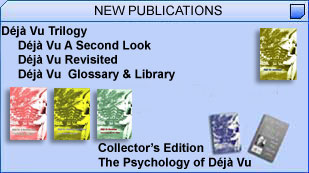The Various Manifestations of Déjà
Vu Experience
 Déjà vu
refers to "any subjectively inappropriate impression
of familiarity of a present experience with an undefined
past." (Neppe, 1983,
The Psychology of Déjà Vu) Because déjà
vu is subjective and has been demonstrated to have
several different subtypes, I do not classify it as
within the domain of psi experience although a subtype
called Subjective Paranormal Déjà Vu
(Neppe, 1981) may be.
Déjà vu
refers to "any subjectively inappropriate impression
of familiarity of a present experience with an undefined
past." (Neppe, 1983,
The Psychology of Déjà Vu) Because déjà
vu is subjective and has been demonstrated to have
several different subtypes, I do not classify it as
within the domain of psi experience although a subtype
called Subjective Paranormal Déjà Vu
(Neppe, 1981) may be.
The terms "déjà experience"
and "déjà vu" are used interchangeably.
There are many ways in which déjà experience
may manifest.
Some of these have specific names:
| déjà entendu |
already heard |
| déjà eprouvé |
already experienced |
| déjà fait |
already done |
| déjà pensé |
already thought |
| déjà raconté |
already recounted |
| déjà senti |
already felt, smelt |
| déjà su |
already known (intellectually) |
| déjà trouvé |
already found (met) |
| déjà vécu |
already lived |
| déjà voulu |
already desired |
At times the demarcation is artificial,
as the déjà experience can coexist in
more than one of the above categories. Moreover, there
are several other common kinds of déjà
experience that have not yet been categorized. Neppe
(in conjunction with Prof BG Rogers, Professor of
French, University of the Witwatersrand) in 1981 suggested
the following additional terms:
| déjà arrivé |
already happened |
| déjà connu |
already known (personal knowing) |
| déjà dit |
already said/spoken (content of speech) |
| déjà gouté |
already tasted |
| déjà lu |
already read |
| déjà parlé |
already spoken (act of speech) |
| déjà pressenti |
already 'sensed' |
| déjà rencontré |
already met |
| déjà revé |
already dreamt |
| déjà visité |
already visited |
Déjà rencontré
appears preferable to déjà trouvé
for the already met experience because it specifically
relates to interpersonal situations.
In the long and arduous process of Neppe rewriting his original 1983 book on déjà vu, two books have been created: Déjà Vu: A Second Look and its companion piece, Déjà Vu Revisited.16. One interesting consequence has been the realization of the necessity for six more kinds of déjà experience. Neppe's original list of 21 (10 developed as above in 1981) (see Déjà Vu Revisited) did not adequately represent the following:
| déjà aprés |
already after (post-ictal) |
| déjà chanté |
already sung |
| déjà ésotérique |
already esoteric |
| déjà halluciné |
already hallucinated |
| déjà mangé |
already already eaten |
| déjà musique |
already heard or played specific music |
| déjà paradoxe |
already paradoxical |
| déjà rétrosenti |
already sensed (as a reanimation of the past) |
| déjà touché |
already touched (physical sensation)
|
These are discussed in detail in Déjà Vu: A Second Look
